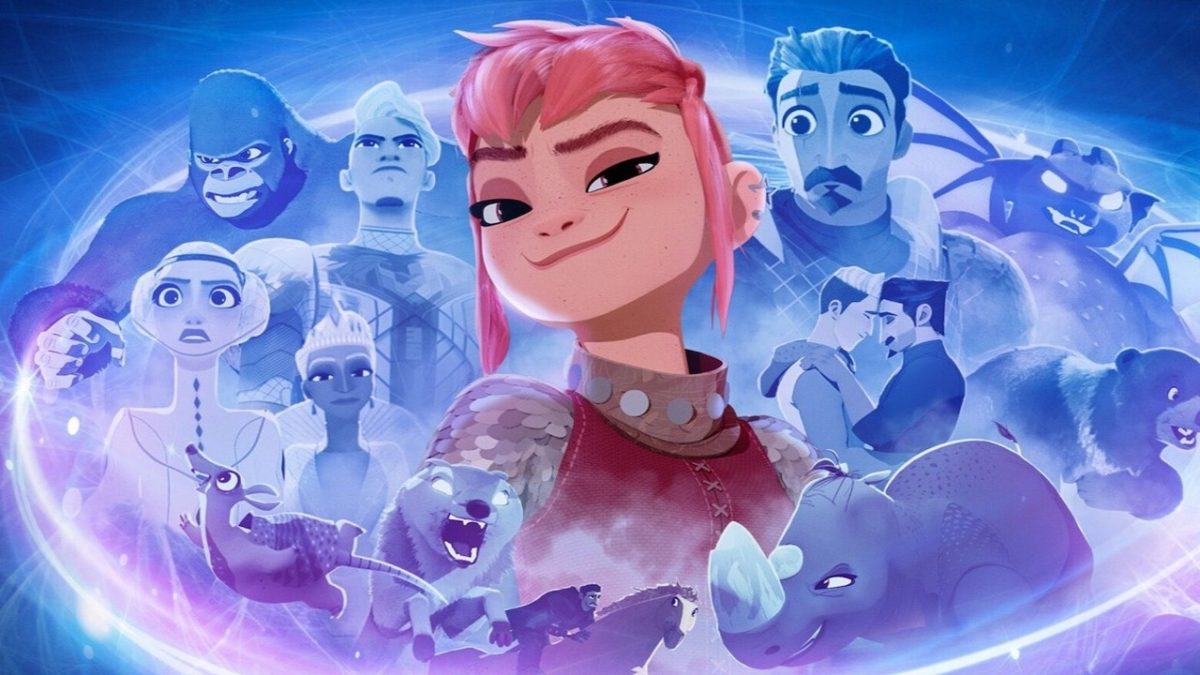I watched the movie “Nimona” this summer, and I was surprised to find that I loved it. I read the graphic novel a few years back, and I had thought it was good, but not great. The themes were interesting, but the story had bad pacing and the art was fairly lackluster. The movie, however, has great animation, and it streamlines and simplifies the plot of the book. “Nimona” is set in a cyberpunk city that is both technologically advanced and extremely traditionalist. This traditionalism stems from the city’s founding myth: A knight, Gloreth, made the land safe to build on by banishing a monster that ruled the area. The resulting cyberpunk-knight aesthetic is part of what makes the art so great.
But I’m not exactly a cinema nerd, so although I liked the acting, animation, cinematography and music, I’ll focus on the story and politics of Nimona instead. The titular character, Nimona, is a shapeshifter who teams up with Ballister Boldheart, a knight who was framed for murder. The resulting story is an overt allegory about accepting queerness. As an example, after a scene full of shapeshifting hijinks, Boldheart says, “I just think it’d be easier if you were a girl.” Nimona responds, “Easier for who?” This line really jumped out at me because it managed to clearly get the movie’s message across without actually saying the word “transgender.” Now, this isn’t exactly groundbreaking; the message of “Shrek” is the same and that came out almost 20 years ago—feeling old yet? But what makes “Nimona” different is how relevant its themes of queer persecution are to the current state of politics, and how its writers made queerness front and center. Some critics didn’t like this move. For example, Slate writer Sam Adams wrote that “‘Nimona’ seems to proceed from the assumption that focusing on diverse protagonists relieves the movie of the need to train its creative energies on any other area.”
I disagree with this criticism. I think that it’s fine for a movie to have a simple story if kids are part of the target audience, and even more so if its political message is timely. Moreover, a failure to make political messages clear can sometimes do real harm by allowing the media-illiterate to misinterpret them.
To demonstrate this harm, consider Marvel’s anti-hero, the Punisher, a vigilante driven to fight crime because his family was killed by criminals. He’s known for being brutal and callous to those who “deserve it.” As with any other comic book character, the Punisher’s politics vary based on who writes him. But in general, the Punisher’s political subtext demonstrates two things: First, that a vigilante is often no different from the criminal they’re trying to stop, because a criminal can also believe they’re doing the right thing. Therefore, the only difference between a vigilante and a criminal is whether or not society agrees with them as a whole. And second, the Punisher’s endless career of violence shows that punishing crime does nothing to prevent it. Often, it does the opposite. A well-studied sociological problem shows that poverty and crime are both a cause and an effect of over-policing, which causes an endless cycle of crime and punishment.
However, these subtle political nuances were not at the forefront when the Punisher’s logo was used by American soldiers in Iraq. The irony here is obvious: Someone familiar with the Punisher could clearly map these two political messages onto the Iraq War. From the perspective of a civilian, a U.S. soldier and the terrorists they’re trying to defeat may seem largely the same. And the Iraq War did nothing to end violence in the Middle East.
The Punisher’s logo is still in use today, especially by the U.S. police and their supporters in response to protests against police brutality. But they don’t engage with the deep moral complexity presented by stories of the Punisher; rather, they like the superficiality of a guy who punishes criminals and doesn’t have to follow rules. This is why political subtlety in entertainment can be dangerous. If the Punisher’s criticisms of retributive justice were front and center, perhaps police today would have to find a different symbol to latch onto for a false sense of comfort in their job.
“Nimona,” on the other hand, is a good model for politics in entertainment. To show what I mean, my favorite line—aside from Gloreth’s battle cry—is the city’s unofficial motto: “Go back to the shadows from whence you came.” I love it because it perfectly uses the medieval tradition-based setting to demonstrate the impetus behind anti-queer activism today. Their goal is to make queer people go away by any means necessary, for them to be erased and silenced, for them to get back into the closet and stay there. And I’m glad that the movie’s writers decided not to make that interpretation ambiguous.
However, “Nimona’s” overt political messaging is rare for a reason. If you take a short look at audience reviews online, you’ll find a pretty even split between five stars and one star. Many viewers were upset that the movie depicts two men kissing, or that the religious organization is portrayed as xenophobic and homophobic, despite historical accuracy. As a movie, it’s certainly more divisive than “Shrek” was. Being overt with political messages may expose the author of a text to more criticism from those who may not like the message. And within a studio, if a writer is subservient to a producer that doesn’t want to ruffle too many feathers for fear of profits suffering, the decision to bury controversial positions within subtle metaphors and ambiguous interpretation is understandable. But writers who have the ability to make their messages crystal clear should. And we as media consumers and critics certainly shouldn’t be snobbishly looking down on their decision to do so.



